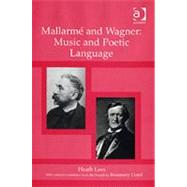MallarmT and Wagner: Music and Poetic Language
, by Lees,Heath- ISBN: 9780754658092 | 0754658090
- Cover: Hardcover
- Copyright: 6/28/2007
To hear Heath Lees talk about Mallarmeacute; is a revelation: where many commentaries appear to lead into mists of complication, he clarifies in simple language how a brilliant mind like Mallarmeacute;''s could consciously turn language into music while letting it tell its own story. Professor Lees''s great strength lies in combining the skills of practical musician (including composer), musical scholar and expert literary commentator. This fascinating book puts a new slant on later nineteenth-century literature and music on both sides of the Rhine. Roy Howat This book challenges and replaces the existing view of Mallarmeacute;''s mission to ''re-possess'' music on behalf of poetic language. Professor Heath Lees shows that Mallarmeacute;''s early knowledge and experience of music was much greater than commentators have realised, and that the French poet actually began his writing career with the explicit aim of making music''s performance-language of ''effect'' the ground of his poetic expression. Integral to the argument is Mallarmeacute;''s reaction to the work and ideas of Richard Wagner. Using a measure of musically informed commentary, Professor Lees surveys the four decades of Mallarmeacute;''s successes and failures in attempting to draw out the musical gestures and resonances of words alone. In the process, he throws new light on many of Mallarmeacute;''s best-known texts, hitherto judged ''difficult'' by those who have failed to appreciate the extent of the poet''s heroic descent through the surface of words in search of ''la Musique''. This book challenges and replaces the existing view of Mallarmeacute;''s mission to ''re-possess'' music on behalf of poetic language. Traditionally, this view focused on only the last fifteen years of the poet''s life, and sprang from a belief in Mallarmeacute;''s ''sudden awakening'' to music during an all-Wagner concert in Paris, in 1885. Professor Heath Lees shows that Mallarmeacute;''s early knowledge and experience of music was much greater than commentators have realised, and that the French poet actually began his writing career with the explicit aim of making music''s performance-language of ''effect'' the ground of his poetic expression. Integral to the argument is Mallarmeacute;''s reaction to the work and ideas of Richard Wagner, whose impact on France came in two waves, the first of which broke during the tempestuous 1860s days of the Paris Tannhauml;user, while the second arrived in the mid-1880s, and gave birth to the Revue wagneacute;rienne. In refuting the critical literature that focuses on only the second of these waves, Lees shows that Mallarmeacute; exhibited a highly informed Wagnerian background during the first wave, and that his grasp of the composer''s gestural motives and flexible musical prose led him towards a new kind of self-expressive, gestural rhythm that aimed musically to reinvent poetic language. In support of this, the book examines closely what Wagner ''really'' said in the prose works that were becoming known in Paris by the 1860s, in particular, Wagner''s important French text the Lettre sur la musique. It also re-examines Baudelaire''s classic Wagner-brochure, and reveals its author''s surprisingly firm grasp of Wagner''s musico-poetic fusion. In musically informed commentary, Professor Lees surveys the four decades of success and failure that resulted from Mallarmeacute;''s repeated attempts to draw out the musical gestures and resonances of words alone. In the process, he throws new light on many of Mallarmeacute;''s best-known texts, hitherto judged ''difficult'' by those who have failed to appreciate the extent of the poet''s heroic descent through the surface of words in search of ''la Musique''. Contents: Introduction; Divergences and convergences; Music and Mallarmeacute;''s generation; Wagner and France; Mallarmeacute;''s Wagneacute;riste influences: Baudelaire, Mendegrave;s, Villiers de l''Isle-Adam; The attempt to repossess music: 186065; The attempt to







